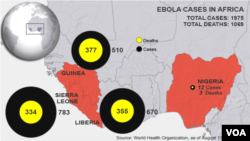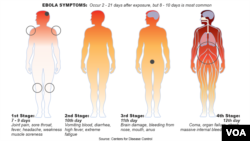The Belgian researcher who co-discovered the Ebola virus in 1976 says "it is now or never" when it comes to testing experimental drugs that could help humans fight Ebola. Guido van der Groen says conditions in West Africa are more conducive for large-scale tests today compared to when he first began studying the virus.
Guido van der Groen says he is not surprised by the extent of the ongoing Ebola outbreak, which has resulted in more than 1,000 deaths in West Africa since February.
The former head of the virology unit at Belgium's Institute of Tropical Medicine says Africa is now a different place from when he first studied Ebola more than 30 years ago in what was then Zaire.
"When we started to find the virus for the first time, the areas in which we found this virus was the northern part of Zaire, which was really a rural area and which was not densely populated and in these days, the mobility of the people was very, very, very low compared to now," said van der Groen.
Van der Groen says while Africa's population density has contributed to the spread of the virus, it could also benefit researchers considering experimental treatments.
"On a daily basis, you still have a decent number of new infections. So, that means that there are a number of patients that you can follow," said van der Groen. "If you have a chance to start to treat some of them, you will learn in a very, very short period if some of these promising products are indeed are beneficial."
Van der Groen is now retired but says he has a lot of correspondence with teams that are working on experimental drugs.
Human trials
One drug under development is a vaccine that contains the strain of Ebola that is currently spreading in West Africa.
The drug, which is based on the human rabies vaccine, is being developed by Matthais Schnell, the director of the vaccine center at Jefferson Medical College in Philadelphia.
"Currently, the plans are to perform the first human trials of the vaccine in two to three years but, depending on funding, we could do it earlier," said Schnell.
Another experimental drug, ZMapp, is being used to treat several people who were infected with Ebola in West Africa.
Thomas Geisbert is a professor of microbiology and immunology at the University of Texas Medical Branch. He says any decision to use experimental Ebola drugs on a wider scale would be complicated.
"I think it is a very complicated question," said Geisbert. "I think it is complex and I think it is probably a question that is best left to the regulatory groups."
He also says pharmaceutical companies have been slow to develop potential drugs that could help fight or prevent Ebola because there is a "small global market" for the products.
He says on a global scale, Ebola cases are relatively low when compared to conditions such as malaria, influenza or cancer.
The current outbreak in four West African countries has affected just under 2,000 people -- although the number of cases continues to grow on a daily basis.






